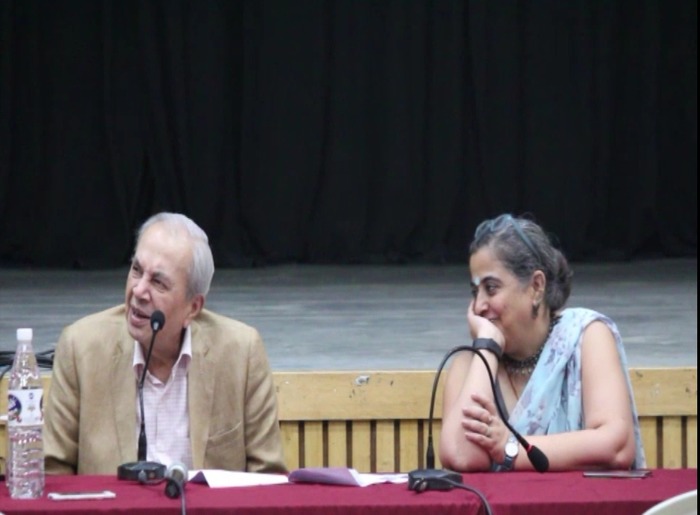Interaction with School chairman on Article 35 A and the National Register of Citizens- classes 10-12
On 4 September 2018, the students of classes X-XII had an interesting and informative interaction with our School Chairman, Mr. Prafull Goradia. As a former member of Rajya Sabha , Mr. Goradia is an authority on several contemporary issues. His interactions with the students have always endeavoured to bring to them some interesting, known and unknown facts and new perspectives about relevant issues.
Vice Principal, Dr. Anu Singh introduced the two keenly debated topics in the media - Article 35 A, according special rights to the citizens of J&K and the National Register of Citizens in Assam. Much is being written and spoken about these two controversial issues in the print and electronic media. It is important therefore, for our students to have a balanced understanding of the historical context in which these two issues are based.
There is none more qualified than our erudite Chairman to share a few nuggets of history, witnessed by him, in his unique and immaculate style. Mr. Goradia began by broadly talking about how Article 35A plays an integral part in the lives of the Kashmiris and the nation, as a whole.
[gallery link="file" order="DESC"]
Sir provided an insight into the largest princely State of Jammu & Kashmir and the fear of Maharaja Hari Singh. The Maharaja feared that the children of Englishmen would settle down in Kashmir and send sensitive information about the princely state to the British government. Around the same time, the pandit community launched a Kashmir for the Kashmiri movement, demanding that only Kashmiris be employed in all state government jobs. Thus, legal provisions for the recognition of the status were enacted by the Maharaja between 1912 and 1932. In 1927, the Hereditary State Subject Order granted state subjects the right to land use and ownership which was not available to non-state subjects.
During Dr. Rajendra Prasads second term as President, Article 35 A was incorporated into the Constitution in 1954 on the advice of the Jawaharlal Nehru Cabinet. Since Article 35A was added to the Constitution by the Executive Head without any discussion in parliament, questions were raised about the manner of its enactment. The separate constitution provided to Jammu and Kashmir under Article 370 was initially a temporary arrangement.
Mr. Goradia explained to the students, in a lucid manner, how the contentious Article discriminates against non-Kashmiris on ownership of property and also in state government jobs. He furnished minute details about the origin and the political climate surrounding the inception of Article 35 A. He also mentioned how this clause has stoked controversy over probable gender discrimination. The Article denies property rights to a woman who marries a person from outside the state.
Next, the focus shifted to the National Register of Citizens (NRC) currently under preparation in Assam. The NRC, as explained by Sir, aims at undertaking a population survey in an attempt to distinguish legal citizens from illegal immigrants from Bangladesh. He brought attention to the integration of Assam with India under Sir Cyril John Radcliffe and also gave a historical perspective of the issue at hand.
In 1951, a newly independent India had its first population census. It was argued at the time of partition that Assam be made a part of East Pakistan as its economy was incomplete without it. Assam being less populated and with lots of rivers and fertile land, was an ideal place for agriculture. In a covert move, the Muslim League tried to change the demography of the region by encouraging a large scale migration of Muslim farmers from East Bengal to Assam.
The Assam Movement of the 1980s was the strongest expression of the sentiment of the people, demanding detection and deportation of illegal immigrants. Sir shared how he and a friend posed as the Press and interacted with the local populace during the 1983 elections.
The session concluded with a brief question and answer round. Students posed insightful questions. An audience member asked, What will be the fate of the 40 lakh people whose names have not been included in the NRC? Sir responded by asking the students to suggest some innovative measures and even offered an award for the most interesting solution. Another question adroitly answered by Sir was Is BJP safeguarding its vote bank by not holding the NRC in Bengal ahead of the 2019 elections? He told the students that the Bengali people would, in fact, be happy if it was conducted now, instead of in 2020.The central government was refraining from using it to garner votes in the forthcoming elections.
All in all, the talk was an enriching experience for all those present there. Our gratitude to Mr.Goradia for the infinite pains he takes to keep us abreast of current issues; filling in personal details to make the subjects more appealing and enjoyable lessons in learning.
Nipunh Kothari, XII E













